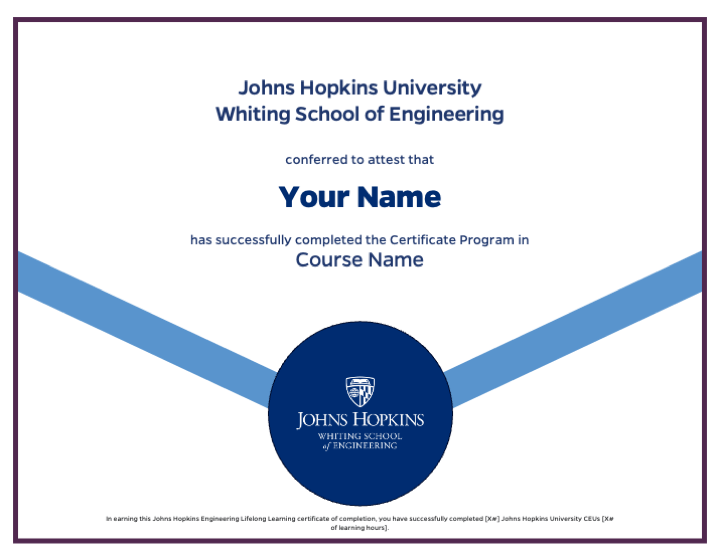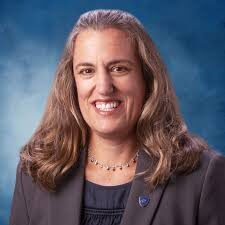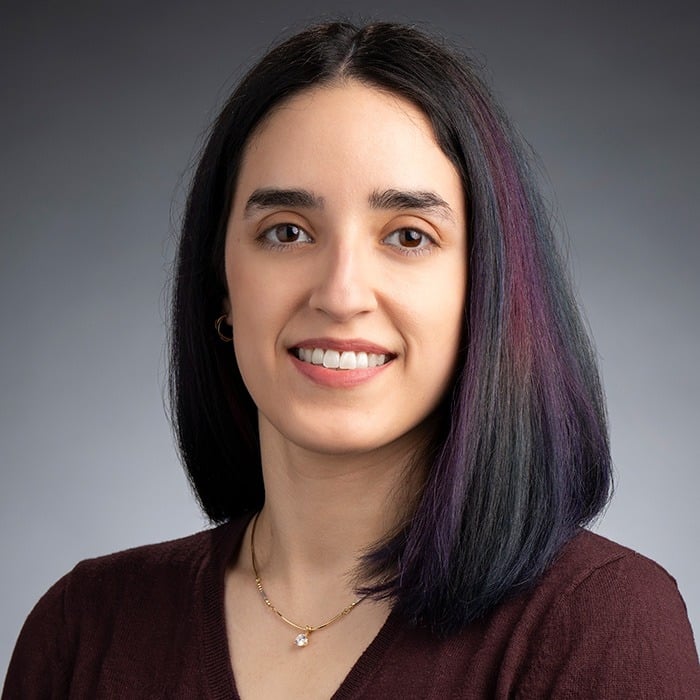SPACE EXPLORATION
Gain technical understanding on how and why space exploration is rapidly changing due to new players, technologies, and cultures entering the market. Elevate your knowledge on the biggest exploration and scientific challenges that the U.S. must tackle to maintain its leadership position.
![]() Next course offering is April 28-29, 2025. Investment: $2800
Next course offering is April 28-29, 2025. Investment: $2800

April 28-29, 2025 • In Person • 555 Pennsylvania Avenue, NW Washington, D.C. 20001 • $2800
Earn a certificate of completion from JHU, a recognized leader in education and research. Earn 2 Continuing Education Units (CEUs) upon course completion.

Space exploration is in the midst of a third transformation in the 21st century. The initial transformation in the 1960s saw human exploration of the moon, early robotic exploration in low-Earth orbit, and initial global satellite navigation for military purposes. The second transformation took America through the 1980s and 1990s of stability in space operations, expansive US use of space in military operations as seen in Desert Storm, bold space science missions like Hubble, and robotic exploration throughout our Solar System. And now, in the 21st century, space is undergoing expansive commercialization, mega constellations, human exploration beyond Earth orbit to the moon and beyond, and contested and competitive militarization. As investments have doubled each year and 1000s of new players have entered the space market, the space industry of yesterday is long gone.
In this 2-day executive course, we will elevate your technical understanding of,
The course will be structured along three topical themes: 1.) Exploration and commercial space, 2.) Space science, and 3.) Demonstrations of space systems.
An optional (but highly recommended) day 3 will involve a 3-stop tour of the space exploration program at the Johns Hopkins University Applied Physics Lab. If interested in the tour, please email [email protected] (in addition to registering for the course).
This course is ideal for leaders responsible for space and seeking to understand the growth and capabilities of today’s impressive space industry.
 Senior government officials
Senior government officials Industry professionals and leaders
Industry professionals and leaders Decision makers
Decision makers Space industry leaders
Space industry leaders Government contractors
Government contractorsDesigned by JHU Faculty, the curriculum covers key areas of today’s civil space exploration.
 Space exploration
Space exploration Low-earth orbit
Low-earth orbit  Space Science
Space Science Thought leadership
Thought leadership Strategic Framework
Strategic Framework
Experience dynamic, face-to-face learning with JHU faculty and fellow professionals in this engaging in-person course. Participate in interactive discussions, hands-on exercises, and real-world case studies while building valuable connections in a collaborative classroom environment.

Johns Hopkins University faculty are readily accessible to address your questions in the course, ensuring a personalized learning experience.

Content and use cases ensure it is current and relevant to today’s civil space exploration.

Hands-on activities that ensure you leave with actionable takeaways.

Dr. Kalirai is also the Program Chair for the Johns Hopkins Whiting School Engineering for Professionals Applied Physics Program.
Prior to his current role, Dr. Kalirai served as mission area executive for Civil Space, where he led the implementation of innovative and cost-effective solutions to critical civil space challenges by developing space science missions, instruments, and research programs – including missions such as New Horizons, Parker Solar Probe, Double Asteroid Redirection Test (DART), Europa Clipper, Lunar Vertex, Interstellar Mapping and Acceleration Probe (IMAP), Electrojet Zeeman Imaging Explorer (EZIE) and Dragonfly.
Before joining APL in 2018, Dr. Kalirai served as the multi-mission project scientist at NASA’s Space Telescope Science Institute. He led strategic initiatives to realize operational, technological, and scientific synergies for the Hubble Space Telescope, the James Webb Space Telescope, and the Nancy Grace Roman Space Telescope. He played a leading role in championing the science of these missions. He previously served as the institute’s project scientist for the James Webb Space Telescope.
In addition to his APL responsibilities, Dr. Kalirai participates in and leads scientific research programs aimed at understanding stellar life cycles. His research group has published more than 100 research papers, and he has given hundreds of invited presentations.
Honors he has received include the American Astronomical Society’s Newton Lacy Pierce Prize, the Maryland Academy of Sciences Outstanding Young Scientist award, and Baltimore Magazine’s “40 under 40” award. Finally, he completed a postdoctoral fellowship as a Hubble Fellow at the University of California, Santa Cruz.
Dr. Kalirai earned a B.S. (with honors) in physics and astronomy, an M.S. in astrophysics, and a Ph.D. in astrophysics, all from the University of British Columbia.

Milena Bobea Graziano is a Chief Engineer in the Space Environmental Effects Group within the Space Exploration Sector at the Johns Hopkins University Applied Physics Laboratory. She holds a bachelor’s degree in Physics from the University of Puerto Rico, and a masters and Ph.D in Materials Science and Engineering from North Carolina State University. Her work focuses on materials and processes selection, qualification, and testing for spaceflight programs, and has worked on several instruments and subsystems for Psyche, Europa Clipper, and the Interstellar Mapping and Acceleration Probe. She is also a Systems Engineer for a gamma ray and neutron sensor instrument going on the JAXA Martian Moons Exploration spacecraft.
As a part of the Lunar Surface Innovation Consortium (LSIC), Milena is co-lead of the Crosscutting Capabilities Focus Area group, and has led the development of Lunar Engineering 101, a lunar resource for scientists and engineers that can aid the design and test of lunar surface systems.

Dr. Nancy L. Chabot is a planetary scientist whose scientific research focuses on understanding the formation and evolution of rocky planetary bodies in our solar system. She was the coordination lead on NASA’s Double Asteroid Redirection Test (DART) mission, is the deputy principal investigator for the Mars-moon Exploration with Gamma Rays and Neutrons (MEGANE) instrument on the JAXA Martian Moons eXploration (MMX) mission and is an interdisciplinary scientist on the joint ESA-JAXA BepiColombo mission. On NASA’s MESSENGER mission, she was the instrument scientist for the Mercury Dual Imaging System (MDIS) and the chair of the Geology Discipline Group. She has been a member of five field teams with the Antarctic Search for Meteorites (ANSMET) program.

Dr. Laura C. Mayorga is an astronomer whose research focuses on understanding the atmospheres and surfaces of extrasolar planets. She works with several planetary mission instruments to study solar system objects as exoplanet analogs. Her pioneering efforts using Cassini observations of the Jupiter system inform direct imaging mission requirements for the detection and characterization of exoplanets.
Dr. Mayorga also sits on the executive committee of the “Characterizing Exoplanets” sub working group of the “Solar Systems in Context” Habitable Worlds Observatory working group. There, she applies her expertise in atmospheric simulations of giant planets and measuring the orbital phase curves of transiting exoplanets with TESS, Kepler, HST, and JWST, to ensure that HWO is designed to return the best exoplanet science.
Gain technical insights on a wide range of new space capabilities.

12 Weeks • Online • Hands-on Projects

12 Weeks • Online • Hands-on Projects

12 Weeks • Online • Hands-on Projects
Submit your details below to learn more about the course curriculum, benefits, fee and more.
Submit your details below to learn more about the course curriculum, benefits, fee and more.